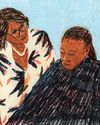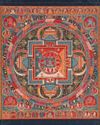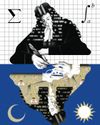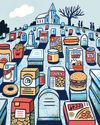
One morning in June, before dawn, cyclists began gathering at an intersection in Emporia, Kansas, to remember the victim of a recent murder. These were professional athletes as well as serious amateurs, on high-end bikes that click-clicked loudly while coming to a stop. The riders hugged; their bike lights blinked. By five-thirty, a few dozen women and men had collected in the dark.
These cyclists had travelled to Emporia to compete in races the following day, in which most of them would ride for two hundred miles, on rolling unpaved roads, for at least nine and a half hours. The event is the biggest in the new niche sport of gravel-bike racing a form of slog that presents itself as both a solo endurance test and a party in the mud. "Gravel" became a cycling term only about a decade ago, to describe machines that are a compromise, in weight and handling, between road bikes and mountain bikes.
Gravel bikes, and gravel racing, have since proliferated-at a time when American participation in racing of the Lance Armstrong kind (skinnier tires, lighter frames) has been in decline. Indeed, the Kansas event, Unbound Gravel, can now fairly describe itself as the most important in all of American competitive cycling-even if many of the hundreds who pay to ride in it each year have little competitive ambition beyond not giving up. Like a big-city marathon, a typical gravel race is both an élite contest and, at the rear, something less pressing. Gravel evangelists sometimes like to compare this mix to a mullet haircut: "Business at the front, party at the back." Emporia, a low-rise college town, had been filling with video crews and podcasters. Banners printed with the muddy faces of past winners hung from street lamps. The manufacturers of rival anti-chafing creams had set up stands.
Denne historien er fra November 14, 2022-utgaven av The New Yorker.
Start din 7-dagers gratis prøveperiode på Magzter GOLD for å få tilgang til tusenvis av utvalgte premiumhistorier og 9000+ magasiner og aviser.
Allerede abonnent ? Logg på
Denne historien er fra November 14, 2022-utgaven av The New Yorker.
Start din 7-dagers gratis prøveperiode på Magzter GOLD for å få tilgang til tusenvis av utvalgte premiumhistorier og 9000+ magasiner og aviser.
Allerede abonnent? Logg på

MEAN TIME
“Hard Truths.”

ENLIGHTEN ME
The secret beauty of mandalas.

THE BEST OF THEM
His was a genius for the ages. Will Gottfried Leibniz ever get his due?

DEATH CULT
Yukio Mishima’ tortured obsessions were his making—and his unmaking.

Prophecy
The night of Dev’s twenty-second birthday, he was invited to sit with the elders after dinner.

A TALE OF TWO DISTRICTS
Lauren Boebert and Colorado’s red-blue divide.

THE TIKTOK TRAIL
Andean migrants draw others to the U.S. with videos depicting themselves as living the American Dream.

LOVE AND THEFT
Did a best-selling romantasy novelist steal another writer's story?

OUR NEW TWO-FACTOR AUTHENTICATION SYSTEM
Our two-factor authentication system is expanding because text messages and e-mailed codes are becoming less secure. Also, we’re committed to making sure your log-in process is more of a hassle than it needs to be.

STILL PROCESSING
Why is the American diet so deadly?